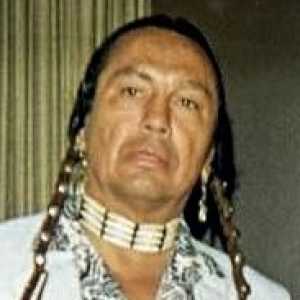Russell Charles Means (November 10, 1939 – October 22, 2012) was an Oglala Lakota activist for the rights of Native Americans, libertarian political activist, actor, musician and writer. He became a prominent member of the American Indian Movement (AIM) after joining the organization in 1968 and helped organize notable events that attracted national and international media coverage.
Means was active in international issues of indigenous peoples, including working with groups in Central and South America and with the United Nations for recognition of their rights. He was active in politics at his native Pine Ridge Indian Reservation and at the state and national level.
Beginning an acting career in 1992, he appeared on numerous television series and in several films, including The Last of the Mohicans and Pocahontas and released his own music CD. Means published his autobiography Where White Men Fear to Tread in 1995.
Early life
Means was born on November 10, 1939 in Porcupine, South Dakota, on the Pine Ridge Indian Reservation, to Theodora Louise Feather and Walter "Hank" Means. His mother was a Yankton Dakota from Greenwood, South Dakota and his father, an Oglala Lakota. As well as Russell, the family had two other boys (William "Bill" and Warren) and three girls (Madonna, Mabel Ann and Phyllis).
He was given the name Waŋblí Ohítika by his mother, which means 'Brave Eagle' in the Lakota language.
In 1942, the Means family resettled in the San Francisco Bay Area, seeking to escape the poverty and problems of the reservation. His father worked at the shipyard in Vallejo. Means grew up in the Bay Area, graduating in 1958 from San Leandro High School in San Leandro, California. He attended four colleges but did not graduate from any of them. In his 1995 autobiography, Means recounted a harsh childhood; his father was alcoholic and he himself fell into years of "truancy, crime and drugs" before finding purpose in the American Indian Movement in Minneapolis, Minnesota.
His father died in 1967 and, in his twenties, Means lived in several Indian reservations throughout the United States while searching for work. While at the Rosebud Indian Reservation in south-central South Dakota, he developed severe vertigo. Physicians at the reservation clinic believed that he had been brought in inebriated. After they refused to examine him for several days, Means was finally diagnosed with a concussion due to a presumed fight in a saloon. A visiting specialist later discovered that the reservation doctors had overlooked a common ear infection, which cost Means the hearing in one ear.
After recovering from the infection, Means worked for a year in the Office of Economic Opportunity, where he came to know several legal activists who were managing legal action on behalf of the Lakota people. After a dispute with his supervisor, Means left Rosebud for Cleveland, Ohio. In Cleveland, he worked with Native American community leaders against the backdrop of the American Civil Rights Movement.
